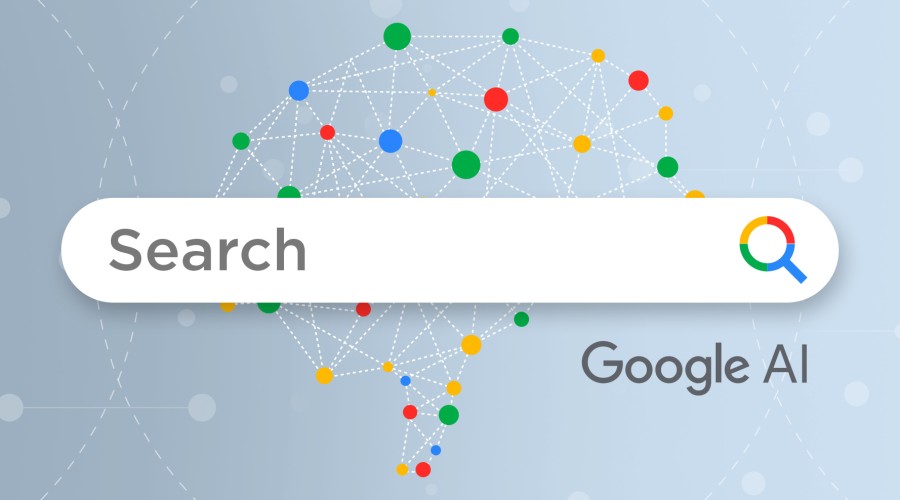In 2024, marketing and business leaders face multiple challenges. They need to adapt to the latest technology innovations like AI while delivering on user privacy and compliance. This article looks at four critical marketing priorities to help get your website keep match fit in 2024 and beyond.
Make your content Google and future-friendly with semantic and entity-based SEO
2024 has seen the roll-out of much anticipated Google AI Overviews, previously known as Search Generative Experience, which is their AI-powered search engine. As expected, this launch has shaken-up SEO as we know it, with many marketing professionals analysing how to get their content featured in the AI overviews, and what we can do to optimise our websites to forward this new feature.
Initial analysis of Google AI Overviews shows that they will work as a conversational assistant: you can type your query into Google and be provided with a detailed AI-powered response to your query. Currently, there appears to be no option to provide more information or context to your original search query, so you’ll need to provide a more detailed response to your original query if it doesn’t provide the information, you are looking for. Various links are then displayed on the right side of your results, showcasing the internet resources used to provide the answer to your query.
So, how can you prepare for this new era of Google Search, a channel so many businesses are reliant on for business success? In addition to the advice in our recent article, we recommend you consider the following:
Add additional value to your content
Businesses that add new research, data, facts, or opinions to their content are likely to benefit. Google AI Overviews will analyse a variety of resources when preparing answers and will want to ensure it’s using a variety of resources with different opinions or angles on the subject matter. Simply regurgitating what’s already published online will mean there is less chance of Google citing your content.
Content structure
Ensuring your content is properly structured will also aid your organic marketing efforts. AI Overviews will want to analyse and understand your content as quickly as possible so ensure you use the correct heading structures, ensure the content is ordered logically with more popular questions prioritised upfront and clear, concise answers provided.
Semantics
It’s important Google understands the context of your content to enable them to deliver your content for relevant search queries. ‘Football’ and ‘soccer’ or ‘pants’ and ‘pants’ mean very different things to US and UK audiences, for example! Adding the right information to provide that context and implementing the relevant schema mark-up is a great way of providing this context and ensuring your website only appears for relevant search queries.

Source: Web Summit, CC BY 2.0 <https://creativecommons.org/licenses/by/2.0>, via Wikimedia Commons
"The future of SEO is all about understanding entities and how they relate to each other. The more search engines understand your content and the entities within it, the better they can surface it for relevant searches."
(Rand Fishkin, Founder of Moz, Source: search engine optimization trends 2024)
Topical, relevant authority
Google AI Overviews will use what they believe are the most recent, reliable, and trustworthy resources on the web. Establishing both your brand and authors as topical leaders will help drive success. This means a laser sharp focus on topics that directly relate to your field. This can be achieved by creating content for your blog, publishing thought leadership on external websites, publishing video content on YouTube channels, participating in podcasts, and speaking at industry relevant conferences.
The benefits of being AI-search ready are clear: we’ve already seen our own business benefit from AI, with some potential clients finding us directly through Chat-GPT and Google Gemini. And we’ll be doing even more in this area in 2024.
Tread very carefully with AI generated content
One of the biggest changes we’ve seen is the use of AI to automate many day-to-day tasks to improve efficiency and, ideally, accuracy. No-one can have missed the huge rise in the amount of AI-generated content being produced on the web! However, the process must be managed with extreme care.
Google announced a Core algorithm update in March 2024, and since this began rolling out some website owners have seen their websites completely removed from Google SERPs. One area Google has targeted are websites that have quickly generated large amounts of low-quality content – which primarily targets AI-generated content. As we said, Google wants you to add additional value to your content, either through experience, research, or providing a different opinion or angle on the subject you’re discussing.

Source: Andrew Kelly, CC BY 2.0 <https://creativecommons.org/licenses/by/2.0>, via Wikimedia Commons
"AI is an incredible tool that can help us be more efficient content creators, but it will never replace the need for human creativity and storytelling. AI-generated content should be used as a springboard, not a crutch."
(Gary Vaynerchuk, CEO of VaynerMedia: Source: ai content marketing 2024)
The problem with AI-generated content is that it can only crawl and use content that’s already been published elsewhere on the internet. It will never be able to provide a new angle, insight or creative ‘leap’, and Google will not want their search results filled with content saying the same things. So while tempting, AI content generation will not lead to long-term success for your business. That said, there are some use cases where AI can be very helpful:
Research
If you’re suffering from writer’s block, AI can conduct quick research and provide an outline of the needed content for an article. You can then add your additional value and insights on top of those recommendations, creating it in your own words. While it won’t help with originality, AI can help you discover what you want to write about and potentially suggest ideas you hadn’t originally considered.
Meta description tags
Every piece of content you add to your website should contain a meta description – or short content summary -so users understand what the content is before clicking from a search engine result. An AI assistant can take the content you’ve created and create an optimised meta description tag. This use of AI is fine as it will only use content you’ve already produced. Just remember to ensure the description is within the recommended pixel limits (approximately 920 pixels or 155 characters).
Content optimisation
There are various AI powered content optimisation tools on the market, including the SEMrush SEO writing assistant, InLinks, or Surfer AI, which analyse the best ranking content for the keywords you want to target. They then recommend edits that will help you rank your content for your target keywords. They can even provide guidance on recommended content length and relevant backlinks that will further help you in ranking your content.
Understand Google E-E-A-T (Experience, Expertise, Authority, Trust)
With growing disinformation and low-quality content being published online, users are likely to gravitate towards content produced by thought leaders and reputable brands. This shift has seen search engines like Google put more emphasis on experience, expertise, authority, and trust (EEAT). The original PageRank system has evolved over the years but getting trusted Websites to talk about your content and refer to your website hasn’t changed. This quote from Maria Haynes sums up it up brilliantly:

Source: Marie Haynes X Account (https://twitter.com/mhc_inc)
"Links can help content get found. If you aren’t an authoritative site that Google hungrily crawls for your new content, then getting links to new pages can help get them discovered by Google. Links can indicate that, out of all of the myriad of pages that are published on the web, yours is one that is worth looking at.
Links from places known to be authoritative for your topics can be helpful…E-E-A-T is Google’s way of taking all of the signals they have that can be used to make a decision on whether you have the level of legitimacy expected for the query.”
(Source: Maria Haynes Consulting Thoughts on E-E-A-T and SEO after 7 years of intensive study - Marie Haynes)
Links are not enough
While links are critical, it’s also important to know E-E-A-T is not an algorithm ranking factor, but instead shows us the importance of demonstrating first-hand or life experience in your content. For example, if you’re a holiday blogger, have you visited the location you’re reviewing and do you share your own experiences? This kind of content is more likely to succeed in this new age of Google.
Follow Google’s advice
Google have previously provided guidance on how to create helpful, people first content so it’s important you review this and audit your own content against the recommendations provided by Google.
Build authentic brands
On top of that, authors should also build their personal brand and become thought leaders in their field of expertise. Businesses should also encourage personal brand development among their team members, particularly on LinkedIn, as this will support the success of any content created on their website.
Prioritise User Privacy & Data Compliance
Barely a day goes by without headlines around user and data privacy violations and technology and analytics providers face increased scrutiny and regulation of their practices. As a result, businesses using these tools are likely to have access to less data that would typically drive business decisions. So, what should you do going forward?

Source: World Economic Forum from Cologny, Switzerland, CC BY-SA 2.0 <https://creativecommons.org/licenses/by-sa/2.0>, via Wikimedia Commons
“Data privacy is a complex issue, but it’s one that we need to address head-on. Users deserve to have control over their data, and businesses need to be transparent about how they collect and use that data.”
Sheryl Sandberg, COO of Meta (Source: data privacy trends 2024).
Get explicit user consent
In early March 2024, Google made it mandatory to implement Consent Mode V2 for websites or apps using customer data to run personalised or remarketing ads through their advertising platform. Anyone using these features need explicit consent from users that they can use their data, otherwise future personalisation and remarketing will not be possible via their platform.
Optimise your cookie policy and design
Consent for Google services is typically provided through a Cookie Management Platform, with users having to provide explicit consent they’re happy to be tracked. There’s increasing pressure on firms to make their cookie notice more transparent and easier for users to decline being tracked, which could result in website owners receiving less information about their users. Get in touch if you want to learn more about our Cookie checklist to ensure you are compliant and user-friendly.
Prioritise first-party data
In light of all the above, it’s critical to ensure you collect first party data on your users, and directly store it in your CRM or database. This can include demographic data, behavioural data and transactional history, along with campaign specific tracking that allows you to understand which campaigns drove those interactions.
Implement a data storage strategy
If you haven’t done so already, you should also start researching into relevant data warehouses where you can store all of your historical performance data. Tools like Google Analytics 4 only store tracking and event history for a maximum of 14 months, and Google Search Console only store historical click and keyword data for 16 months, making it more important than ever for organisation to store and own all their data.
If you want to make your website and content future-ready for AI and more besides, our comprehensive digital optimisation and data analytics services can support you with all the above challenges, so do get in touch today to find out how we can help.


